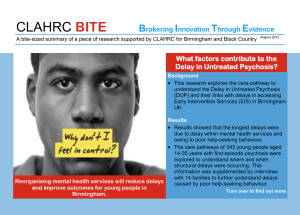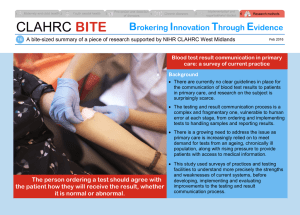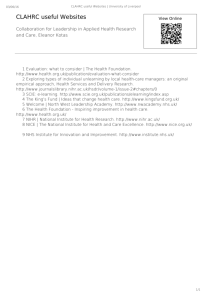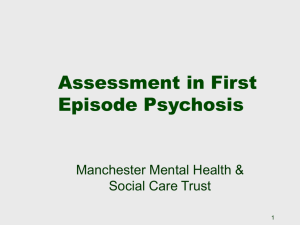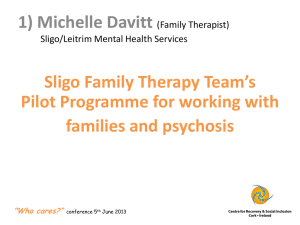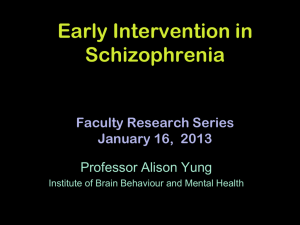CLAHRC BITE B
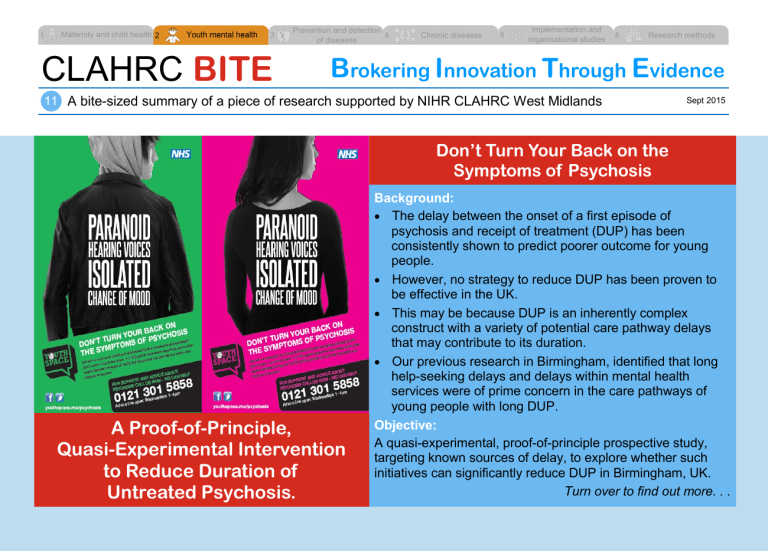
CLAHRC
BITE B
rokering
I
nnovation
T
hrough
E
vidence
11
A bite-sized summary of a piece of research supported by NIHR CLAHRC West Midlands
Sept 2015
A Proof-of-Principle,
Quasi-Experimental Intervention to Reduce Duration of
Untreated Psychosis.
Don’t Turn Your Back on the
Symptoms of Psychosis
Background:
The delay between the onset of a first episode of psychosis and receipt of treatment (DUP) has been consistently shown to predict poorer outcome for young people.
However, no strategy to reduce DUP has been proven to be effective in the UK.
This may be because DUP is an inherently complex construct with a variety of potential care pathway delays that may contribute to its duration.
Our previous research in Birmingham, identified that long help-seeking delays and delays within mental health services were of prime concern in the care pathways of young people with long DUP.
Objective:
A quasi-experimental, proof-of-principle prospective study, targeting known sources of delay, to explore whether such initiatives can significantly reduce DUP in Birmingham, UK.
Turn over to find out more. . .
Method:
A new youth access pathway for first-episode psychosis was introduced alongside a psychosis awareness public heath campaign. Incident cases of first-episode psychosis were identified and their DUP and care pathways measured. We also used extensive recent DUP data from the NIHR National EDEN study, which was available to define the baseline.
Results:
The relative reduction in DUP in the intervention area was 0.735 (95% CI 0.348 to 0.893; p=0.0039)
(accounting for baseline period), showing a clear relative reduction.
Conclusion:
Whilst our proof-of-principle trial did not include followup assessment of clinical symptoms or treatment outcome (issues which should be future priorities in future DUP research), the real world design of our proof-of-principle study was evidence based; targeted known sources of delay in our healthcare setting; was firmly placed in the local context; had strong external validity; had high quality collection of data from a baseline period; and included a prospective control region – increasing the robustness of our evaluation.
Reference
Connor C, Birchwood M, Palmer C, et al. Don’t turn your back on the symptoms of psychosis: a proof-of-principle, quasi-experimental public health trial to reduce the duration of untreated psychosis in Birmingham, UK. BMC
Psychiatry. 2013.
13 :67. [ Online ]
Recommendations for Practice
The methodology we have used may reduce the DUP of young people experiencing first-episode psychosis.
Youth mental health is at the forefront of the UK political agenda and identification of an effective generalized methodology to reduce
DUP, for use in a variety of healthcare contexts, sits well within this current political context.
What is NIHR CLAHRC
West Midlands?
The Collaborations for Leadership in
Applied Health Research and Care
(CLAHRC) is a partnership between universities (Birmingham, Warwick and
Keele) and a number of health and social care organisations in the West
Midlands. We are funded by the National
Institute for Health Research with a mission to undertake high-quality applied health research focused on the needs of patients to improve health services locally and beyond.
For further information, visit: www.clahrc-wm.nihr.ac.uk
The research is funded by the National
Institute for Health Research. The views expressed are those of the author and not necessarily those of the NHS, the NIHR or the Department of Health.
